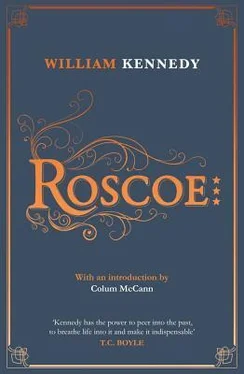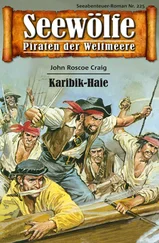“What about Elisha?”
“Everything,” Gladys said. “Come immediately. The mill.”
Roscoe had the bellman call up his car and he drove to Fitzgibbon Steel, a small city of twenty-nine buildings — rolling mills, forges, furnaces, shearing shops, machine shops, and a maze of Delaware and Hudson Railroad tracks running through it all. It covered twenty-eight acres between Broadway and the river in the northeast corner of the city, and had employed fifteen hundred men and a hundred women in the peak war years.
Roscoe parked by the mill’s office in the machine-shop building and went in past the night guard, up to the third floor, the stairs aggravating his pain. He found Gladys in a leather chair staring at Elisha, whose horn-rim glasses were on his desk, a flesh-colored bandage on his forehead where it had hit the windshield. The sleeves of his tailor-made blue shirt were rolled to the elbow, his dark-blue tie loose at the open collar, his gray suit coat on the back of his chair, hands folded in his lap, chin on his chest, wearing his favorite cordovan wingtips, and facing the fireplace full of ashes. His face was pale blue, and strands of his hair, gray as the chromium steel he manufactured, hung in his eyes, which Gladys had closed.
Elisha at fifty-four.
As Roscoe stared at him, Elisha stood up, walked to the bathroom, and began shaving with his electric razor. Roscoe followed him.
“Who gave you the okay to die?” Roscoe asked.
“You know what they say,” Elisha said. “Never meet the enemy on his own ground.”
“Which enemy?”
“If you don’t have a solution, you transform the problem.”
“What problem?”
“The same old EP on the bing and the kitty bosso. ”
Then Elisha, in the midst of his peerless babble, fell over backward, dead again.
“I’ve been here all night,” Gladys said to Roscoe. “He came in at seven o’clock last night and called me at the house and asked me to come back.”
“With that head injury, I’m surprised Veronica let him go out.”
“He convinced her he was all right.”
“When did he die?”
“I don’t know. I slept, I woke up and saw him, and I called you. We worked hours in the file room pulling out old letters. I got filthy moving those boxes. He knew the exact years. He’d read one file and ask for another. Then he’d burn some in the fireplace. He said to give you this.” She handed Roscoe a notarized letter from Elisha naming Roscoe executor of his estate. “He told me, ‘The enemy is closing in,’ and I asked him, ‘Who?’ and he said, ‘Roscoe will figure it out.’ What enemy, Roscoe?”
“We have many,” Roscoe said, pocketing the letter. “What did he burn?”
“Real-estate files, contracts, deeds, canceled checks, letters, insurance papers, bank statements out of the safe.”
“Write down any specifics you remember. Why did you stay so late?”
“After he burned the papers I started to leave, but he said, ‘Can you stay tonight? I need your company.’ It’s the first time he ever admitted he needed me. Twenty-five years, every day all day, sometimes weekends, trusting me to do what needed doing.”
Gladys stared at Elisha in his death chair, put her hand on his forehead, and stroked the hair off his face. He opened his eyes and winked at her.
“Mac was coming over to the house on his dinner break,” she said, “but I called and told him I was working late. Then Elisha poured us some whiskey from a Christmas bottle he had on the closet shelf. I never drink whiskey.”
The whiskey and two empty glasses were on Elisha’s desk.
“Where did you sleep?”
“On the sofa. He stayed in the chair, thank you.”
“How did he do it?”
“What? You think he did it?”
“So do you, don’t you? Why did you call me instead of the ambulance?”
“Who else would I call?”
“How about Veronica?”
“She wouldn’t know what to do, how to protect him. She’d end up calling you anyway.”
“You find any bottles or pills?”
“I didn’t look.”
They looked in the desk, in the safe, in Elisha’s coat, in the cardigans hanging in the closet, in the medicine cabinet, in all his pockets, but found no pills, only a wallet. Roscoe counted its cash: “Four hundred and seventy-seven,” he said, and put the money back in the wallet and pocketed it.
Roscoe examined the photos on the desk: Elisha and Veronica sailing with their boy Gilby; Alex in battle jacket, steel helmet, and boots, jabbing his rifle-with-bayonet at the camera. On the wall, Elisha was being sworn in as lieutenant governor, and Roscoe remembered his line after taking the oath: “This is a great job for a man with misguided ambition.” There was Elisha at a 1929 political dinner with Governor FDR, and again in 1943 with President FDR as he made Elisha a dollar-a-year man for donating his expertise in steel production to the wartime government, the check for one dollar framed with the photo.
In a corner of the office stood another fragment of history, a silvery-gray 1860 Fitzgibbon woodstove, chrome-trimmed, three mica windows, sculpted feet, a work of foundry art made by Lyman Fitzgibbon, who established the foundry when the world was new and turned out three hundred stoves a day, ninety thousand a year, until the industry went west to the ore sources. The foundry tripled the fortune Lyman had already made through land speculation and railroads, the same fortune Ariel, Elisha’s father, would fribble away, and that Elisha, when he was barely out of college, young magus of the new day, would replenish. With the help of a Yale classmate’s father’s two patents, for making rail joints and springs for railroad cars, he stabilized the firm. He then oversaw the introduction of the first electric furnaces for making alloy steels, and the very early pouring of stainless steel in the U.S., both ventures coming just after the first war. How did he know so much about steel? He began at the blacksmith level, rolled up his sleeves with every worker who could teach him anything; did the same at the research level of the industry and became an intuitive wonder.
It was going for five, and the first shift of the shops came in at six-fifteen. Roscoe swept the ashes out of the fireplace and flushed them down the toilet, Gladys vacuumed the fireplace and rug and dusted the room, and Roscoe called his brother at Hattie’s house.
“Who’s calling at this hour?” Hattie asked.
“It’s Roscoe, Hat. Put O.B. on.”
“Yeah,” said the half-asleep O.B.
“Need you at the mill,” Roscoe said. “There’s been a bad accident and I need you. Immediately.”
“What accident?”
“For chrissake, just get here.” And Roscoe hung up.
Gladys handed him her list of files Elisha had burned, then collapsed back into her chair. Roscoe started to pour two short whiskeys but decided that maybe this whiskey was poisoned. He let it sit and found an unopened bottle on Elisha’s closet shelf and poured the drinks. He and Gladys sipped the whiskey while they waited for O.B.’s official police inquiry to begin, an inquiry that would willfully discover death from natural causes and little else. If anyone discovered anything true about this death it would be Roscoe.
“Whiskey twice in the middle of the night,” Gladys said. “What’s the world coming to?”
“Less and less.”
Roscoe opened the drapes on the interior picture window that offered a view of the great machines in the shop below: lathes, drills, punches, boring mills, monster planers, and the great cranes that loomed over all three bays of the shop. Elisha had built this window for the vision it gave of the world he’d salvaged out of the ashes of his father’s folly, a world he’d known so intimately for thirty-four years and which, until this morning, depended on him for its perpetuation, just as the Party had depended on him. Roscoe watched the sun entering the machine shop’s windows, watched it rise on Fitzgibbon Steel’s thirty-six smokestacks and shape them into long black fingers pointing upward into this shabby new day.
Читать дальше












